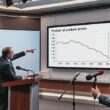The German government’s recent tightening of welfare benefits, known as “Bürgergeld”, has garnered surprisingly broad public support, according to a new poll conducted by Forsa for RTL and n-tv. The survey, based on responses from 1,008 participants collected between October 10th and 13th, 2025, reveals that 74% of respondents believe that missed appointments at job centers should now result in significant reductions to basic income support. Only 24% oppose the policy change.
The level of endorsement is strikingly consistent across the political spectrum. While unsurprisingly high among supporters of the Christian Democratic Union (CDU/CSU) – with 89% in favor – and the Alternative for Germany (AfD) – hitting 91% – even a substantial majority of Social Democratic Party (SPD) voters (73%) are supporting the measure. Disapproval is largely confined to the Green Party and Left Party bases.
This widespread acceptance of welfare reform raises critical questions about the broader public perception of social responsibility and the current welfare system’s efficacy and potentially underscores a growing discomfort with perceived entitlements. Critics argue the move risks disproportionately impacting vulnerable populations and may not address the root causes of unemployment and poverty.
Beyond social policy, the poll also illuminates deep divisions concerning climate policy. A clear majority (63%) of Germans now advocate for reversing the European Union’s planned ban on new gasoline and diesel car sales starting in 2035. Just 33% wish to maintain the ban. This reversal sentiment, driven largely by concerns over affordability and practicality, cuts across traditional party lines. While staunchly supported by Green Party (86%) and Left Party (57%) voters, the ban faces significant opposition from CDU/CSU (70%), SPD (57%) and AfD (93%) supporters.
The prevailing desire to overturn the combustion engine ban highlights a potential conflict between EU-mandated climate targets and the realities faced by the German electorate – a key area of political tension as the next federal elections approach. The data suggests a growing reluctance to accept policies perceived as economically burdensome and disconnected from everyday life, potentially forcing a re-evaluation of Germany’s commitment to the EU’s ambitious climate agenda.





